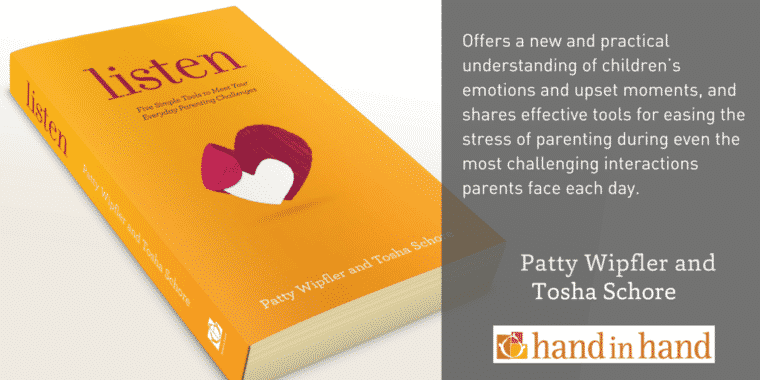Q. My 5 year old is not big on hellos or goodbyes. Most of the time, I have been okay with this, but there are times when it seems inappropriate. For example, when we visited my family on the East Coast. My daughter didn't connect with my dad too much despite having spent a lot of time in his house. When he took us to the airport, my dad tried to give her a hug goodbye but she refused. I felt bad and didn't push her, but I did express to her that that didn't feel good to Grandpa and that he's her grandfather (implying that she “should” have given him a hug).
For example, when we visited my family on the East Coast. My daughter didn't connect with my dad too much despite having spent a lot of time in his house. When he took us to the airport, my dad tried to give her a hug goodbye but she refused. I felt bad and didn't push her, but I did express to her that that didn't feel good to Grandpa and that he's her grandfather (implying that she “should” have given him a hug).
How do you suggest handling these situations?
A. Great topic! Here are my thoughts, and a few ways to use Listening Tools to loosen things up for your child and others.
We need to support our children to give affection when they feel like it, when it comes from the heart. If we force our children to give affection in ritual ways, or on demand, to adults who “deserve” it, there may be unintended consequences.
If they have to be affectionate with adults when we want them to, will they able to stick up for themselves under other circumstances? Will they feel strong enough to say “no” under the pressure to agree to someone’s touch in order to please that person, or to “prove themselves?” I think that compliance with adult wishes for affection is not what we want for our children. We want them to experience real relationships, with a genuine show of affection that’s mutual and fulfilling.
My personal policy is that no child or grandchild of mine has to give any particular kind of affection to relatives, guests, friends, or even to me as mom or grandma. I recommend this policy. That way you and others will receive real affection on your daughter’s timetable. You’ll have to be surprised as to when and where her affection will be expressed.
On the other hand, it's easy for children to feel so isolated that they can’t be tender, reach out, or show caring. When they are upset, this is how they are – and, come to think of it, so are we! They need our help to relax, get connected, and acknowledge the presence of others around them. It's a good idea to help them with saying hello or goodbye to relatives and friends. We need to find a way to nudge them toward a bit of contact in a way that's not coercive.
We want to help them defend their integrity.
Long-range, we can find ways to use Listening Tools to help children when they have come to hate ritual kinds of contact so that they can regain their ability to acknowledge and connect with the people in their lives. What I like to do is to set the expectation that they will do some kind of acknowledgment of people at hello or goodbye. Exactly how they do that is up to them.
Try Laughter…
When grandpa comes, you could set this up by saying, “Honey, Grandpa is here. How do you want to say hello?” If she runs away, you then say, lightly, “Oh, that’s how you say hello! I see! You run away. Hmmm, I wonder how Grandpa is going to say hello to you? Let's see if he can find you!” You then prompt Grandpa to give big generous air kisses when he finds her. Maybe this turns into an affectionate chase game for a little while. You would hope for some laughter (if your tone is pleased and surprised enough, laughter will come), and some good will from grandpa.
If she buries her head in your shoulder, then you say, “Hmmm, we have a buried girl here. Let's see if her foot can say hello,” and you move her foot. She withdraws, of course, because she is showing you a place where she can’t feel safe. You continue, lightly, “Oops, Grandpa, no foot-hello today. Maybe she can do a trotting hello. Stay there, Grandpa, we're coming!” and you back away, then trot toward him with her in your arms, bounce, bounce, bounce, then bonk into his shoulder. You're hoping for laughter. If not, I would try that again, saying, “Hmmm, didn't work this time, but I bet it will work if we do it again. Get ready for your trotting hello, Grandpa! We're coming!”
…Or Tears
You might get a good cry. You might, if she's really locked into withdrawal, have to move toward gently prying her away from you an inch or two, and letting her cry about not wanting to say hello. You have to explain this situation to Grandpa, of course. “Sorry she’s feeling shy. Her feelings come up when she’s with people she feels safe with, so this is actually a complement to you, Dad. When she’s cried, she’ll be able to connect better with you.”
But What Will my Parents Say?
It may be that you won’t be able to use Listening Tools right then and there, because of judgments that will come down on you and on her from a Dad who can’t understand children’s upsets. In that case, let her sit there awhile, and say, “Grandpa, She's going to say hello to you in her own way. Let's be on the lookout for how she does it.”
Your daughter will find a way–every child wants to connect. Find any excuse, and call it “Her hello.”
If you set up the expectation and follow your child's lead, pretty soon, her fears around ritual engagement should fade and you'll be able to see the very real affection she wants, and is able, to show when she feels safe.
Hello/Goodbye Games
For children that have hard time connecting games that roleplay the action of coming and going can break down barriers.
Hold-a-gaze hide and seek: While doing pillow fights, when you are down and have been “gotten” by a pillow, hide your face, and say, “Oooh, is she out there? I don't want to look!” then, slowly, peek out, saying, “Ohhh, I hope no one is looking at me! I don’t want to see anyone’s eyes!” Peek, squeal, and hide again. Often children who have a hard time connecting love this game. You've reversed the roles, and it's hilarious to them. They burn into you with their gaze, and you keep hiding, timidly come out, and show that you’re still afraid to be caught by her gaze.
I'm going to give you 100 kisses: Take a big-hearted but slow and goofy stance. Hold your arms out, and say, “I have great big kisses for you. Here I come!” and then walk toward her, but walk straight into the wall instead, or run into the sofa and plop down. She is yards away. You missed! Try again, but fail to hug her. Then, full of consternation, try backing towards her, thinking that your hugs might be able to find her if you go backwards. You get the idea.
Put out lots of effort to hug, lots of goofy tries, while she gets to dance away and laugh at your silliness. Beg and plead for just one kiss, and as you lurch toward her, kiss the air with your eyes closed, or kiss a chair or the doorjamb. Then open your eyes and see that you’ve lost again! She's not there. Whatever gets the most laughter is the thing to keep doing.
No huggie, no kissie: A version of the above, which can become a frequent game upon arrival and departure. You try to hug or kiss, and your child runs. You make as much eye contact as you can—that’s the acknowledgment and the connection that matters. Everything else is frosting on that cake—it’s not necessary, but you can playfully try for more. You spend 3 minutes trying hard for a hug or a kiss, and when you decide you're done, you say, “Great! I got no hugs. no kisses. But someday, someday, someday, I'll get one! I'll just have to try again next time! Thanks for a good run around the house!”
In these games, you do need to make physical contact, playfully, sooner or later. If you don't, your child will feel, deep inside, like there's something wrong with her. The contact you make should be playful, physical, possibly very brief if your child tenses or freezes when you come that close. Watch what promotes laughter, and keep at it. Some children need lots of physical wrestling to promote laughter and eye contact. Others need you to stay across the room most of the time for them to feel safe enough and in charge enough to laugh. You'll see what works. If your child screeches, you're coming on too strong.
inside, like there's something wrong with her. The contact you make should be playful, physical, possibly very brief if your child tenses or freezes when you come that close. Watch what promotes laughter, and keep at it. Some children need lots of physical wrestling to promote laughter and eye contact. Others need you to stay across the room most of the time for them to feel safe enough and in charge enough to laugh. You'll see what works. If your child screeches, you're coming on too strong.
These games help relieve children’s paralysis when affection is expected of them, but not felt by them. And they can help undo big feelings about those adult expectations, which often look automatic, and therefore unappealing, to children. They’ll help you set up interesting, fresh, never-before-experienced hellos and goodbyes, in which your child can play at connecting, and succeed, sooner or later, when laughter has bestowed its very special effect on the hearts of young and old.
And, Lastly, Don't Forget Grandpa Time
You also might consider introducing your father to the idea of Grandpa Time. It’s a simple idea, but can really help awkward grandparents begin to build a relationship with their grandchildren on the grandchild’s terms. You set up something interesting and unusual to do: play dough in 4 colors; gluing buttons to art paper; playing with pipe cleaners; or taking the dog for a walk with a kerchief around his neck. It’s not Special Time, per se, but it’s something you set up to ease them into contact and connection. You can hover a bit, to keep your daughter feeling safe, but stay in the background, so your father can be the featured adult.
Let us know what you try, and how it works out!
Patty
Don't miss our monthly newsletter for more playful parenting tips and advice, workshops and free calls. Sign up here.

